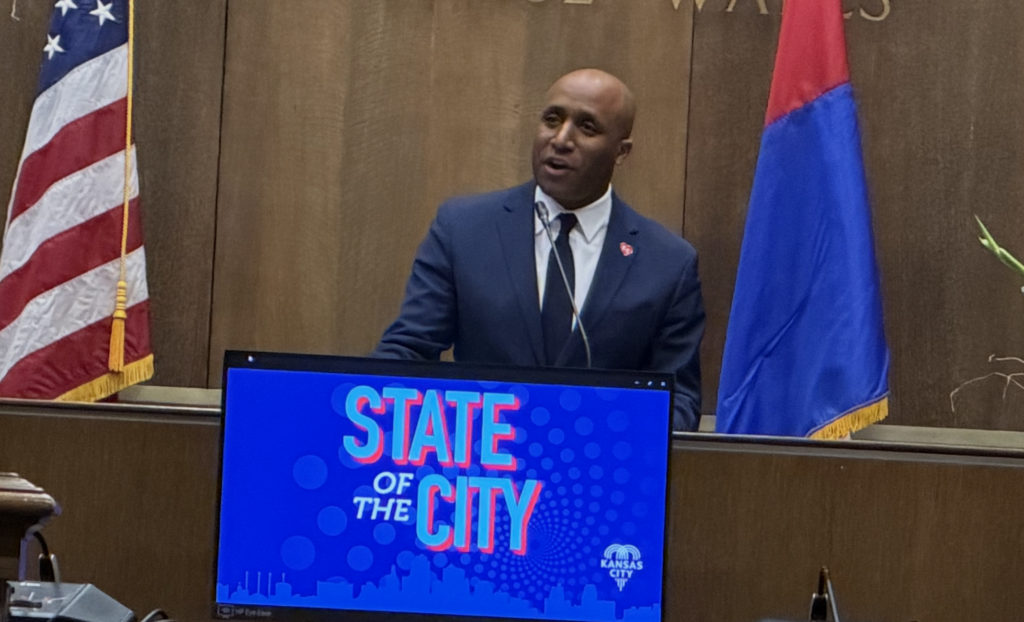Kansas lawmaker denounces influence of national far-right groups on state laws
In new podcast episode, Rep. Susan Ruiz says she feels ‘pressure on my shoulders’ to combat anti-LGBTQ model bills.

Rep. Susan Ruiz, a Shawnee Democrat, discusses legislation passed by the Republican-dominated Legislature during a July 19, 2023, Kansas Reflector podcast recording. (Sam Bailey/Kansas Reflector)
TOPEKA — Susan Ruiz feels a lot of pressure to resist legislation coming from national far-right organizations.
As a clinical social worker, Latina and one of the first openly gay state representatives, Ruiz, a Shawnee Democrat, said she needed to advocate for many different groups in Kansas but felt a special responsibility for standing up for LGBTQ rights — especially in recent months, with lawmakers voting into law several transphobic pieces of legislation crafted and promoted by national hate groups.
“There’s so many things that I have to be able to speak out for, and/or against,” Ruiz said during a conversation for the Kansas Reflector podcast. “There’s a lot of groups in my head, and so I’m always having to kind of juggle all of that. But the reality is for me, I feel the pressure on my shoulders to carry the LGBTQ community.”
Ruiz has served three terms, first campaigning for her position in 2018. Ruiz said that she and fellow LGBTQ lawmaker Rep. Brandon Woodard, a Lenexa Democrat, had joked about their “gay agenda,” which included public school funding and Medicaid expansion.
“A part of that long list that we had was to try to protect our rights as citizens, LGBTQ citizens in the state of Kansas, and we’ve not been able to accomplish that,” Ruiz said.
Leafing through a printed-out packet of state legislation influenced by national organizations, Ruiz recounted her experience speaking out against a transgender student athlete ban. The Legislature successfully overrode Gov. Laura Kelly’s veto of the law in April.
Following the House’s successful vote on the ban, Ruiz cursed in frustration after she said she heard Republican lawmakers who voted for the ban laughing. Ruiz said some of her Republican colleagues later apologized for the conduct of their party members.
“I think we are getting more and more allies, even if they are closeted allies in one sense,” Ruiz said. “I’m still hopeful that we can, at some point, be able to change things around for the LGBT community.”
Ruiz also spoke against Senate Bill 180, one of the most well-documented laws to come out of the 2023 legislative session.
SB 180, or the “women’s bill of rights,” advises that anyone not born with a female reproductive system should be banned from female-specific spaces, such as bathrooms and locker rooms.
Another portion of the bill bans state agencies from changing gender markers on birth certificates and drivers’ licenses, though the state’s attorney general is entangled in a legal battle with LGBTQ rights groups to determine the extent of this provision.
This model legislation comes from Independent Women’s Voices, a far-right group that has a long history of opposing women’s rights, including the Equal Rights Amendment and equal pay. Alliance Defending Freedom, which the Southern Poverty Law Center identifies as an anti-LGBTQ hate group, crafted the model legislation for the student athlete ban.
While the transphobic laws have been discussed more frequently, Ruiz pointed out the impact national lobbying groups had on other legislation this session.
Opportunity Solutions Project, a Florida-based conservative think tank, dove into legislation restricting elections following former President Donald Trump’s claims of election fraud in 2020. As the lobbying arm of the Foundation for Government Accountability, OSP works in statehouses across the country to oppose Medicaid, food support and unemployment programs.
The group has testified in support of Kansas election legislation that would have reduced mail-in ballot voting and also lobbied for House Bill 2141, a bill that would have denied federal food stamp benefits from parents who owed child support.
The group opposed House Bill 2179, which would end the state policy of denying federal child care support to single parents who don’t cooperate with the pursuit of unpaid child support.
The group also encouraged Kansas lawmakers to add new restrictions on federal food support for low-income people in their 50s, a plan that passed and became law July 1.
Ruiz said lawmakers needed to be carefully examining the sources for model legislation.
“A lot of these groups are not based in Kansas,” Ruiz said. “They may have an office in Kansas, but they’re not based in Kansas. They’re coming from Florida, Texas, Virginia. And it’s interesting, because when I’ve looked at their websites, they all say they’re either nonpartisan, or they’re bipartisan. Yet, when you read everything on the issues and the resources, and then their policy papers that they put out, it’s very biased.”
Kansas Reflector is part of States Newsroom, a network of news bureaus supported by grants and a coalition of donors as a 501c(3) public charity. Kansas Reflector maintains editorial independence. Contact Editor Sherman Smith for questions: info@kansasreflector.com. Follow Kansas Reflector on Facebook and Twitter.




